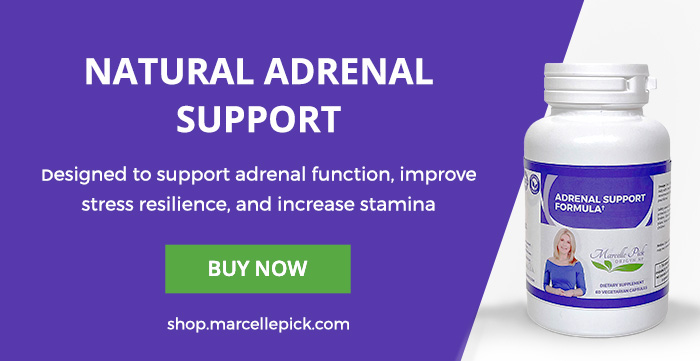My friend Becca made a massive list of new year’s resolutions last year. Newly (and happily) single, with a brand new business of her own, she felt motivated and ready to make all kinds of positive changes in her life, both personal and professional.
But when I checked in with her throughout the year, she admitted that she was struggling to meet her goals. The truth is, this is pretty common and relatable! But something my friend told me really stuck with me.
“Every day, I want to do those things I set out to do,” she said, “I never forget about them, and I’m not lazy. But I just feel too tired.”
This year, I helped Becca come up with a different kind of resolution. This would be the year she would beat adrenal fatigue, restore her healthy stress response, and get her energy back.
If you’ve been struggling with adrenal fatigue, or you can relate in any way to Becca’s story, I want to help you make and meet the same resolution. Today, I’ll share some of my top strategies for stopping adrenal dysfunction in its tracks, and getting back to you.
Is your stress response faulty?
A lot of women struggle to understand whether or not they “have” adrenal fatigue. This completely makes sense. First of all, the information available online is either overwhelming or absent, confusing, and often contradictory. Second of all, there’s no conclusive adrenal fatigue test that you can run.
Beyond that, your holistic practitioner might tell you you have adrenal fatigue, while your family doctor simultaneously says this condition doesn’t exist!
All of these factors– not to mention the fact that symptoms of adrenal dysfunction are variable and non-specific– can make it incredibly challenging to figure out the truth.
From what I’ve seen throughout all of my years in practice, most women experience some degree of adrenal fatigue throughout their lives. And I’m less concerned with whether we want to call this adrenal fatigue, adrenal dysfunction, HPA axis dysfunction, or something else– the point is, collectively, our stress responses are suffering.
This may be unsurprising to many of my readers (and to most people who are paying attention to our modern world!). Between personal and emotional stress, watching the news, the pandemic, our busy jobs, our busy lives, rising costs of pretty much everything… it’s no wonder we’re exhausted.
The good news is that there is a way to heal your stress response and your overall health. And it all starts with recognizing that something is off.
Signs of Adrenal Dysfunction
How do you know if your stress response is in need of some TLC? Sometimes, it’s just a gut feeling. If you feel more tired more often than you should, that’s one key indication.
Here are some of the most common signs and symptoms of adrenal dysfunction:
- Constant, frequent, or excessive fatigue
- Difficulty falling or staying asleep
- Feelings of anxiousness or overwhelm
- Brain fog or difficulty concentrating
- Irritability
- Frequent sugar cravings
- Over-reliance on caffeine
- Waking up feeling unrested
- Experiencing an afternoon “crash”
These are all warning signs that your adrenals may have been working on overdrive, leading to what is essentially physiological burnout and an impaired response to stress (of all kinds).
Now, let’s explore what to do about it!
How to Beat Adrenal Fatigue This Year
If you’ve been dealing with the symptoms and feelings described above, I’m here to tell you that this is your year to make a change. And no matter what else you hope or plan to accomplish, know that restoring your adrenal function using these simple, holistic strategies will help to get you there.
- Set boundaries. Let’s start with one of the most challenging but most important resolutions of all. Learning how to say no! SO many women know on some level that certain work commitments or personal relationships are wearing them out, but they’re not sure how to pull back or walk away. This year, take some time to really reflect on the situations in your life that are draining you. Ask yourself what boundaries you can set to relieve this stress (Is it a matter of delegating certain tasks? Taking a break from a friendship? Setting the expectation that your phone will be turned off on Sundays?). Finally, communicate those boundaries to the relevant people in your life.
- Eat anti-inflammatory foods. What you eat plays a huge role in how well your adrenals function. Opt for a wide variety of whole, anti-inflammatory foods, including healthy fats, lean proteins, leafy greens, and high quality sea salt– and, while you’re at it, say no to pro-inflammatory foods like sugar, refined flour, and anything processed.
- Practice mindfulness in a way that works for you. Mindfulness has been having a real moment lately, and some people may be tired of hearing so much about meditation. But there are actually all kinds of ways you can introduce more mindfulness into your life, and they don’t all involve the traditional kinds of meditation we tend to think of (though those are fantastic as well!). For example, you may practice mindfulness by taking a walk every morning without your cell phone or any other distractions. You may practice mindfulness by sitting and listening to a beautiful piece of music, with or without your eyes closed. There’s no right or wrong way to practice– just explore what makes you feel present and connected to yourself.
- Heal your gut. Restoring your gut health is one of the most important (and often overlooked) things you can do to improve adrenal dysfunction. It’s important to understand that stress goes beyond the mental and emotional (e.g. feeling stressed about work) – things like leaky gut or an imbalance in your gut microbiome are also stressful for your body, and can throw your hormones and adrenal function out of whack. Consider introducing probiotics into your routine to help balance your gut microbiome, and/or getting a stool test done with your functional medicine practitioner to see if there may be something going on in your gut that you’re unaware of.
This year is about you
I know that new year’s resolutions in and of themselves can be stressful. Worrying about whether or not you’re following your new habits or practices perfectly, wondering whether or not you’re doing enough… leave all of that behind! The best way to approach these changes is as intentions: do your best, understand your “why”, and be gentle with yourself as you go along. That’s the real secret to all of this working, and to restoring your adrenal function, energy, and most vibrant self. Happy new year!








